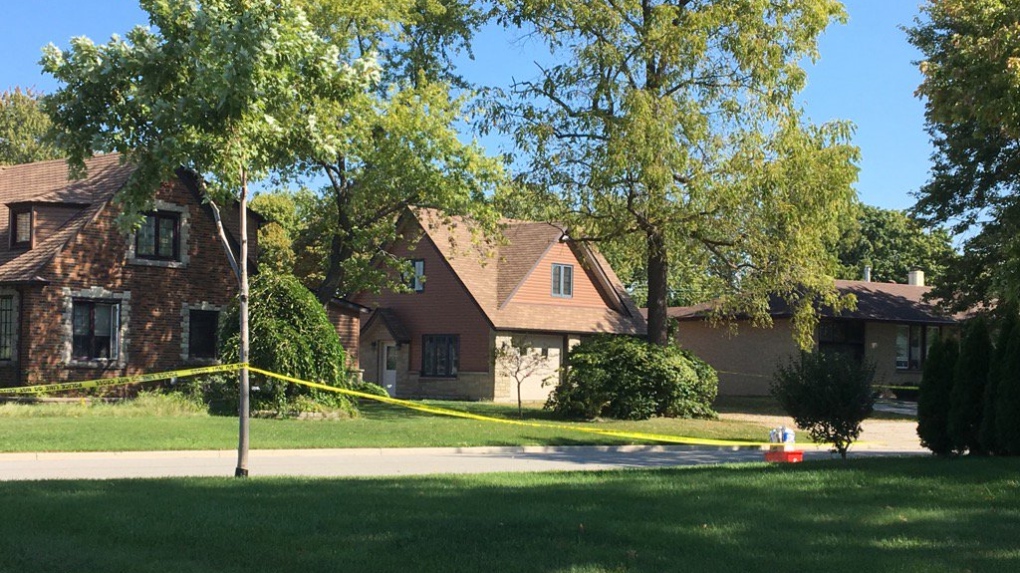Jury makes 15 recommendations in Romanick inquest
 Amherstburg police investigate a shooting on Sandwich Street in Amherstburg, Ont., on Friday, Sept. 15, 2017. (Christie Bezaire / CTV Windsor)
Amherstburg police investigate a shooting on Sandwich Street in Amherstburg, Ont., on Friday, Sept. 15, 2017. (Christie Bezaire / CTV Windsor)
WARNING: This story discusses suicide and may contain details some find disturbing.
The jury in the inquest into the 2017 death of Chad Romanick of Windsor has returned 15 recommendations meant to prevent similar deaths of people in crisis in the future.
On Thursday, the inquest concluded on its seventh day when the jury’s recommendations were brought forward shortly after 6 p.m.
The recommendations focus on enhanced training for police, 911 operators and healthcare professionals.
The jury also calls for a 24-hour urgent care clinic focused on crisis care be explored as part of a suite of measures to ensure people in crisis are properly assessed, treated and managed.
A further recommendation from the jury calls for two 911 calls made by Romanick be part of scenario-based training for police and emergency dispatchers to help improve de-escalation techniques.
WARNING: Contains graphic content
Court heard Romanick died on Sept. 15, 2017 at 2:11 p.m. in the garage of his Betts Avenue home in Windsor after he suffered a shotgun round to the head.
Officials have listed his death as suicide.
Romanick was in his home as police surrounded the property in an attempt to arrest the 34-year-old following a shooting in Amherstburg.
Court heard Romanick had shot a man in the chest with a shotgun around 2:30 a.m. at a home on Sandwich Street in the town.
Officers had tried to speak with Romanick to no avail. Police entered the home sometime after hearing gunfire to find Romanick dead in the garage.
The seven-day inquest also heard about Romanick’s troubles with depression and addiction.
The jury was tasked not with finding any guilt, but making recommendations aimed at improving emergency response to crises.
A separate investigation by Ontario’s Special Investigations Unit (SIU) determined there was no criminal wrongdoing by any of the officers who responded to the call that day.
CTVNews.ca Top Stories

Bloc MPs will vote confidence in Liberal government next week: Blanchet
The Conservatives' first shot at toppling the Liberal government is likely doomed to fail, after Bloc Quebecois Leader Yves-François Blanchet told reporters his MPs will vote confidence in the government.
Here's why you should get all your vaccines as soon as possible
With all these shots, some Canadians may have questions about the benefit of each vaccine, whether they should get every shot and how often to get them, and if it's safe to get them all at once or if they should space them out.
Teen faces new charge in Sask. high school arson attack
A 14-year-old student who allegedly set her classmate on fire is facing a new charge.
'I'm here for the Porsche': Video shows brazen car theft in Mississauga
Video of a brazen daylight auto theft which shows a suspect running over a victim in a stolen luxury SUV has been released by police west of Toronto.
First-of-its-kind facility hopes to launch Canada into rare earths market
A Saskatchewan organization is breaking ground as the first to commercially produce rare earth metals in North America.
Jeremy Dutcher makes Canadian music history
Jeremy Dutcher made Canadian music history Tuesday night by winning a second Polaris Music Prize for his second album, Motewolonuwok.
Exploding electronic devices kill 20, wound 450 in second day of explosions in Lebanon
Lebanon's health ministry said Wednesday that at least 20 people were killed and 450 others wounded by exploding electronic devices in multiple regions of the country. The explosions came a day after an apparent Israeli attack targeting pagers used by Hezbollah killed at least 12 and wounded nearly 3,000. Here are the latest updates.
RCMP feared they didn't have enough evidence to hold terror suspect sought by U.S.
Court documents filed in the case of a Pakistani man arrested in Quebec for an alleged plot to kill Jews in New York City reveal the RCMP didn't have enough evidence to hold him in Canada.
Federal government to further limit number of international students
The federal government will be further limiting the number of international students permitted to enter Canada next year. It’s the government’s latest immigration-related measure to address Canadians' ongoing housing and affordability concerns.


































